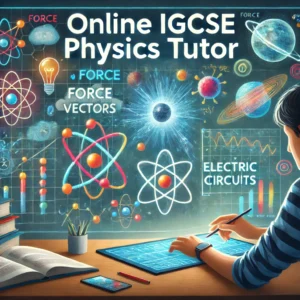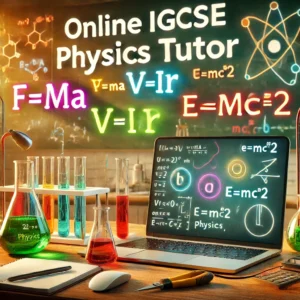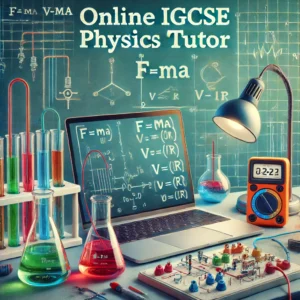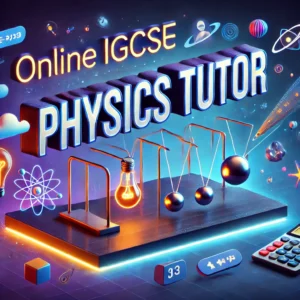Cambridge IGCSE Physics (0625) Tutor
Welcome to Noble Learners, your ultimate solution for excelling in Cambridge IGCSE Physics. Our Online IGCSE Physics Tutor program offers a comprehensive and personalized learning experience, guiding students through the critical concepts of the IGCSE Physics (0625) syllabus. Whether you’re preparing for Core or Extended exams, our expert tutors are here to help you succeed
Why Study Physics?
Physics is fundamental to understanding the universe, from the smallest particles to the largest galaxies. The Cambridge IGCSE Physics syllabus equips students with the knowledge and skills to explore careers in engineering, technology, astrophysics, and beyond. Mastering physics not only prepares students for higher education but also fosters critical thinking and problem-solving skills essential in many professions.
Why Choose Noble Learners for IGCSE Physics Tutoring?
Experienced Tutors: Our Online IGCSE Physics Tutors are seasoned educators who are deeply familiar with the Cambridge syllabus. They provide targeted instruction tailored to each student’s needs, ensuring that challenging topics like motion, forces, energy, and electricity are fully understood.
Interactive Learning: We offer an engaging online platform that brings the classroom to your home. Through live sessions, real-time quizzes, and practical problem-solving exercises, students are prepared for both theoretical and practical aspects of IGCSE Physics.
Tailored Lessons: Every student has unique learning needs. Our Online IGCSE Physics Tutor customizes lessons to match the student’s pace and preferred learning style, ensuring that they grasp complex concepts such as nuclear physics, waves, and electricity.

IGCSE Physics Syllabus Overview
Our Online IGCSE Physics Tutor program covers all topics outlined in the Cambridge IGCSE Physics (0625) syllabus:
1. Motion, Forces, and Energy
- Speed, velocity, and acceleration
- Newton’s Laws of Motion: Explore forces, mass, weight, and friction.
- Work, Energy, and Power: Learn about kinetic and potential energy, conservation of energy, and mechanical power.
- Momentum: Understand how momentum is conserved in collisions.
2. Thermal Physics
- Kinetic Particle Theory: Explore the behavior of solids, liquids, and gases at the particle level.
- Specific Heat Capacity: Learn about energy transfer, specific heat capacity, and thermal equilibrium.
- Changes of State: Study melting, boiling, and evaporation, along with their applications.
- Transfer of Thermal Energy: Discover conduction, convection, and radiation.
3. Waves
- General Properties of Waves: Learn about wave speed, wavelength, frequency, and amplitude.
- Reflection and Refraction: Understand how waves interact with surfaces and different media.
- Electromagnetic Spectrum: Study different types of waves, including radio waves, microwaves, and X-rays.
- Sound Waves: Explore the properties of sound, including pitch, frequency, and amplitude.
4. Electricity and Magnetism
- Simple Electrical Circuits: Understand current, voltage, resistance, and Ohm’s law.
- Magnetic Fields: Learn how magnetic fields are generated and their applications in electromagnets and motors.
- Electromagnetic Induction: Study how electricity can be generated from magnetism.
5. Nuclear Physics
- Atomic Structure: Explore protons, neutrons, and electrons.
- Radioactivity: Understand radioactive decay, half-life, and the applications of radioactivity.
- Nuclear Fission and Fusion: Study how energy is generated in nuclear power plants and stars.
6. Space Physics
- The Solar System: Explore the planets, stars, and galaxies.
- Gravity and Orbits: Learn about gravitational fields and how celestial bodies interact.

Exam Preparation and Assessment
Exam Preparation with Our Online IGCSE Physics Tutor
Our tutors prepare students for all exam formats, ensuring familiarity with both Core and Extended syllabuses. Here’s what students can expect:
- Paper 1: Multiple Choice (Core) – 40 questions based on the core syllabus, 30% of the total grade.
- Paper 2: Multiple Choice (Extended) – 40 questions covering both core and extended syllabus, 30% of the total grade.
- Paper 3: Theory (Core) – Short-answer questions covering core topics, 50% of the total grade.
- Paper 4: Theory (Extended) – Short-answer and structured questions, 50% of the total grade.
- Practical Paper (Paper 5 or 6) – Students choose between a practical test or an alternative to practical, 20% of the total grade.

IGCSE Physics (0625) Important Questions
1. What is the SI unit of force?
a) Newton
b) Joule
c) Watt
d) Pascal
Correct Answer: a) Newton
2. What is the formula for calculating speed?
a) Speed = Distance / Time
b) Speed = Force / Area
c) Speed = Mass / Volume
d) Speed = Energy / Time
Correct Answer: a) Speed = Distance / Time
3. What type of wave is sound?
a) Transverse
b) Longitudinal
c) Electromagnetic
d) Surface wave
Correct Answer: b) Longitudinal
4. What is the approximate acceleration due to gravity on Earth?
a) 9.8 m/s2
b) 8.9 m/s2
c) 10.8 m/s2
d) 7.8 m/s2
Correct Answer: a) 9.8 m/s2
5. What is the primary energy source for the Earth?
a) The Sun
b) The Moon
c) Earth's core
d) Nuclear power plants
Correct Answer: a) The Sun
6. What happens to the pressure of a gas when its volume is reduced at constant temperature?
a) The pressure increases
b) The pressure decreases
c) The pressure stays the same
d) The pressure becomes zero
Correct Answer: a) The pressure increases
7. Which of the following is a scalar quantity?
a) Velocity
b) Force
c) Speed
d) Momentum
Correct Answer: c) Speed
8. What is the relationship between frequency and wavelength for a given wave speed?
a) They are directly proportional
b) They are inversely proportional
c) They are equal
d) They are unrelated
Correct Answer: b) They are inversely proportional
9. What type of energy is stored in a stretched spring?
a) Kinetic energy
b) Chemical energy
c) Elastic potential energy
d) Gravitational potential energy
Correct Answer: c) Elastic potential energy
10. What is the unit of electric current?
a) Volt
b) Ampere
c) Ohm
d) Joule
Correct Answer: b) Ampere
11. What is the phenomenon when light bends as it passes through a different medium?
a) Reflection
b) Refraction
c) Diffraction
d) Interference
Correct Answer: b) Refraction
12. What is the energy transformation in a hydroelectric power plant?
a) Kinetic to chemical energy
b) Gravitational potential to kinetic energy
c) Chemical to electrical energy
d) Gravitational potential to electrical energy
Correct Answer: d) Gravitational potential to electrical energy
13. Which of the following is a renewable energy source?
a) Coal
b) Solar energy
c) Natural gas
d) Nuclear energy
Correct Answer: b) Solar energy
14. What is the SI unit for work done?
a) Joule
b) Newton
c) Watt
d) Pascal
Correct Answer: a) Joule
15. What is the frequency range of audible sound for humans?
a) 20 Hz to 20,000 Hz
b) 0 Hz to 10,000 Hz
c) 100 Hz to 1,000 Hz
d) 10,000 Hz to 100,000 Hz
Correct Answer: a) 20 Hz to 20,000 Hz
16. What is the function of a fuse in an electric circuit?
a) It stores electrical energy
b) It increases the voltage
c) It prevents overloading
d) It controls the direction of current
Correct Answer: c) It prevents overloading
17. What is the speed of light in a vacuum?
a) 3 x 108 m/s
b) 3 x 106 m/s
c) 5 x 108 m/s
d) 1 x 108 m/s
Correct Answer: a) 3 x 108 m/s
18. Which of the following is a vector quantity?
a) Speed
b) Distance
c) Displacement
d) Energy
Correct Answer: c) Displacement
19. Which law explains the force between two charged objects?
a) Newton’s First Law
b) Coulomb’s Law
c) Hooke’s Law
d) Snell's Law
Correct Answer: b) Coulomb’s Law
20. What is the unit for measuring resistance?
a) Volt
b) Ampere
c) Ohm
d) Joule
Correct Answer: c) Ohm
21. What type of wave is light?
a) Longitudinal
b) Transverse
c) Mechanical
d) Sound wave
Correct Answer: b) Transverse
22. Which of the following is used to measure electric current?
a) Voltmeter
b) Ammeter
c) Ohmmeter
d) Galvanometer
Correct Answer: b) Ammeter
23. What is the process called when a solid changes directly into gas?
a) Condensation
b) Evaporation
c) Sublimation
d) Freezing
Correct Answer: c) Sublimation
24. What is the main use of step-up transformers?
a) To increase the current
b) To increase the voltage
c) To decrease the resistance
d) To decrease the power loss
Correct Answer: b) To increase the voltage
25. What is the relationship between power, current, and voltage?
a) Power = Current x Voltage
b) Power = Voltage / Current
c) Power = Current / Voltage
d) Power = Current x Resistance
Correct Answer: a) Power = Current x Voltage
26. What is the function of a diode in an electrical circuit?
a) To convert AC to DC
b) To increase voltage
c) To decrease current
d) To store energy
Correct Answer: a) To convert AC to DC
27. What is the frequency of mains electricity supply in most countries?
a) 50 Hz
b) 60 Hz
c) 100 Hz
d) 120 Hz
Correct Answer: a) 50 Hz
28. What is the purpose of using a fuse in a circuit?
a) To control the current flow
b) To increase resistance
c) To protect the circuit from overloading
d) To increase the voltage
Correct Answer: c) To protect the circuit from overloading
29. Which of the following quantities is conserved in an elastic collision?
a) Mass
b) Energy
c) Momentum
d) All of the above
Correct Answer: d) All of the above
30. Which of the following gases causes the greenhouse effect?
a) Oxygen
b) Carbon dioxide
c) Nitrogen
d) Hydrogen
Correct Answer: b) Carbon dioxide
31. Which particle in an atom has a negative charge?
a) Proton
b) Neutron
c) Electron
d) Nucleus
Correct Answer: c) Electron
32. What does the gradient of a velocity-time graph represent?
a) Distance
b) Speed
c) Acceleration
d) Force
Correct Answer: c) Acceleration
33. What is the main component of the Sun’s energy production?
a) Nuclear fission
b) Chemical combustion
c) Nuclear fusion
d) Radioactive decay
Correct Answer: c) Nuclear fusion
34. What is the unit of frequency?
a) Newton
b) Hertz
c) Watt
d) Joule
Correct Answer: b) Hertz
35. What property of a sound wave determines its pitch?
a) Amplitude
b) Frequency
c) Wavelength
d) Speed
Correct Answer: b) Frequency
36. Which phenomenon is responsible for the blue color of the sky?
a) Diffraction
b) Refraction
c) Rayleigh scattering
d) Reflection
Correct Answer: c) Rayleigh scattering
37. What is the process of energy transfer through electromagnetic waves?
a) Convection
b) Radiation
c) Conduction
d) Diffusion
Correct Answer: b) Radiation
38. What is the principle of conservation of energy?
a) Energy cannot be created or destroyed, only transformed
b) Energy can be created but not destroyed
c) Energy can be destroyed but not created
d) Energy can be both created and destroyed
Correct Answer: a) Energy cannot be created or destroyed, only transformed
39. What is the function of an optical fiber?
a) To reflect light
b) To transmit light through total internal reflection
c) To diffract light
d) To absorb light
Correct Answer: b) To transmit light through total internal reflection
40. What happens to a gas when it is compressed at constant temperature?
a) Its pressure decreases
b) Its pressure increases
c) Its volume increases
d) Its temperature decreases
Correct Answer: b) Its pressure increases
41. Which material is used as the filament in light bulbs?
a) Iron
b) Copper
c) Tungsten
d) Aluminum
Correct Answer: c) Tungsten
42. What is the main principle behind a hydraulic press?
a) Pascal’s Law
b) Archimedes' Principle
c) Bernoulli’s Principle
d) Newton’s Second Law
Correct Answer: a) Pascal’s Law
43. What is the relationship between pressure and volume of a gas at constant temperature?
a) They are directly proportional
b) They are inversely proportional
c) They are unrelated
d) They are equal
Correct Answer: b) They are inversely proportional
44. What is the angle of incidence equal to in a plane mirror reflection?
a) The angle of refraction
b) The angle of diffraction
c) The angle of reflection
d) The critical angle
Correct Answer: c) The angle of reflection
45. What does the slope of a distance-time graph represent?
a) Distance
b) Time
c) Speed
d) Acceleration
Correct Answer: c) Speed
46. Which of the following is not an electromagnetic wave?
a) X-rays
b) Radio waves
c) Sound waves
d) Infrared rays
Correct Answer: c) Sound waves
47. What is the purpose of a capacitor in a circuit?
a) To store charge
b) To increase resistance
c) To step up voltage
d) To decrease current
Correct Answer: a) To store charge
48. What is the energy stored in a moving object called?
a) Potential energy
b) Kinetic energy
c) Thermal energy
d) Chemical energy
Correct Answer: b) Kinetic energy
49. What happens to a substance's temperature during a phase change (e.g., melting)?
a) It increases
b) It decreases
c) It remains constant
d) It oscillates
Correct Answer: c) It remains constant
50. What is the main principle behind the operation of a transformer?
a) Electromagnetic induction
b) Thermal conduction
c) Refraction
d) Diffraction
Correct Answer: a) Electromagnetic induction

FAQs
What makes an IGCSE Physics tutor from Noble Learners effective?
Our Online IGCSE Physics Tutors are highly experienced and specialize in the Cambridge IGCSE Physics syllabus. They simplify complex concepts, provide individualized attention, and offer interactive sessions that help students develop a deep understanding of the subject, preparing them for both Core and Extended exam patterns.
How does personalized tutoring help with IGCSE Physics?
Personalized tutoring ensures that the tutor focuses on the specific needs of the student. This approach helps students grasp difficult physics concepts, like electricity, waves, and motion, and work through challenging problems. Personalized lessons also allow students to move at their own pace, improving their overall performance in the IGCSE Physics exams.
What technology do I need for online IGCSE Physics tutoring?
You need a stable internet connection and a device such as a computer or tablet with Zoom installed. For interactive lessons, having access to a pen tablet is advantageous but not essential. Our tutors may also use online simulations and resources to enhance learning.
Can I schedule my IGCSE Physics tutoring sessions according to my time zone?
Yes, we offer flexible scheduling options. Our Online IGCSE Physics Tutors are available to work with students worldwide, and sessions can be scheduled to suit your time zone, including evenings and weekends, to ensure maximum convenience.
How do I book a free demo session?
You can book a free demo session by contacting us via WhatsApp. Our representative will help you schedule the demo at a time that works for you. The demo session will give you a chance to experience our tutoring style before committing to the full program.
What is the policy for rescheduling missed sessions?
To reschedule a session, please notify us at least 24 hours in advance. Sessions not rescheduled within this time frame will be considered completed, and the fee will apply. This policy ensures consistency and accountability in the learning process.
How are tutors matched with students?
At Noble Learners, we carefully match each student with a tutor based on their academic needs, learning style, and the topics they need help with. Our IGCSE Physics tutors are selected for their expertise in the Cambridge curriculum, ensuring that each student gets the support they need to excel.
What if I am not satisfied with my demo tutor?
If you’re not satisfied with your demo tutor, you can request a second demo with a different tutor at no extra cost. We offer up to two free demo sessions to ensure you find the right tutor for your learning needs. Additional demos beyond the two free sessions will have an associated fee.
Is the IGCSE Physics curriculum fully covered?
Yes, our tutors follow the Cambridge IGCSE Physics (0625) syllabus closely. All key topics, including forces, energy, thermal physics, and atomic physics, are covered in depth, ensuring that students are well-prepared for their exams.
How do I handle payments for classes?
Payments are to be made in advance to the official Noble Learners bank account. For example, if you wish to continue classes for the upcoming month, payment must be made before the month begins to secure your spot and ensure ongoing lessons.
